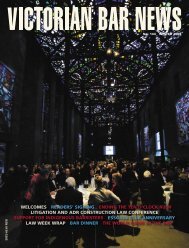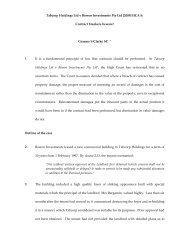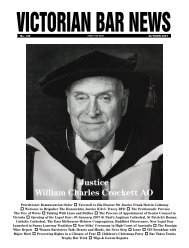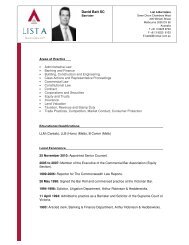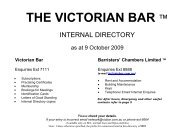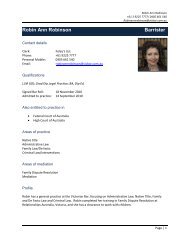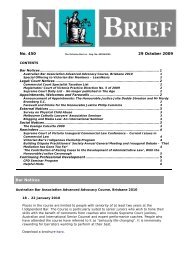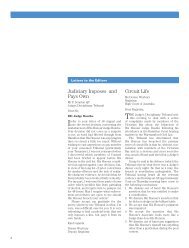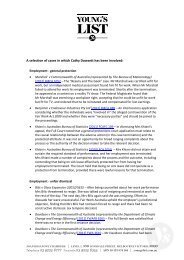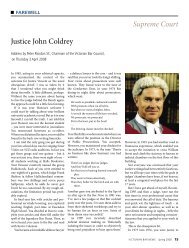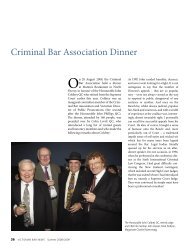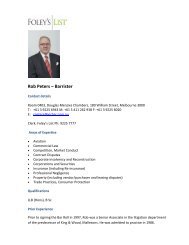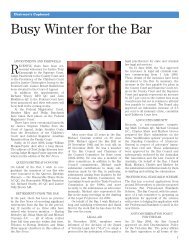Farewell to His Honour Mr Justice Frank - Victorian Bar
Farewell to His Honour Mr Justice Frank - Victorian Bar
Farewell to His Honour Mr Justice Frank - Victorian Bar
- No tags were found...
Create successful ePaper yourself
Turn your PDF publications into a flip-book with our unique Google optimized e-Paper software.
News and Views<strong>Farewell</strong> <strong>to</strong> <strong>His</strong> <strong>Honour</strong> <strong>Mr</strong> JuOn the occasion of his retirement from the Court of Appeal of the SupremeCourt of Vic<strong>to</strong>ria delivered on Thursday 22 February 2007In a recent admissions ceremony your<strong>Honour</strong> referred <strong>to</strong> the book commonlycalled the Politics in which Aris<strong>to</strong>tledescribes law as “a kind of justice”:Law is not perfect justice. It is only a kindof justice. It is a fallible, human project, apractical means by which we are <strong>to</strong> do ourbest, in the circumstances of real life, <strong>to</strong>achieve justice.On this day in which your <strong>Honour</strong> isfarewelled as a judge by the legal professionand the State of Vic<strong>to</strong>ria, no one coulddoubt that you have dedicated 37 years ofservice <strong>to</strong> the law (including 11 years as aJudge of Appeal of the Supreme Court) <strong>to</strong>doing your best, in the circumstances ofreal life, <strong>to</strong> achieve justice.On behalf of the At<strong>to</strong>rney-General, mayI express his gratitude, and the gratitudeof the State of Vic<strong>to</strong>ria, for your <strong>Honour</strong>’sextended and devoted service <strong>to</strong> theadministration of justice in this State onthe occasion of your <strong>Honour</strong>’s retirementfrom the Supreme Court.Your <strong>Honour</strong> was born in Sydney on10 November 1945, and in your infantyears your family moved <strong>to</strong> Melbourne.Your <strong>Honour</strong> attended MelbourneChurch of England Grammar School(now Melbourne Grammar School)from 1958 <strong>to</strong> 1964. During your time atMelbourne Grammar, you were awardeda Wadhurst entrance scholarship, a JuniorGovernment Scholarship, and a SeniorGovernment Scholarship. You matriculatedwith Special Exhibitions in Latin andFrench, a General Exhibition and a TrinityCollege Exhibition. The following year,when, in Melbourne Grammar cus<strong>to</strong>m,you repeated Matriculation, you obtainedfour first-class honours as well as beingBruce House Captain, Prefect, schoollibrarian and a Cadet under officer.These achievements aside, your fellowstudents at Melbourne Grammar recallthat from your very first day it was clear<strong>to</strong> them that they were in the presenceof an exceptional intellect. One friend24<strong>His</strong> <strong>Honour</strong> <strong>Mr</strong> <strong>Justice</strong> Callaway.remembers that in your first English class,your teacher gave all of the students fiveminutes’ free time <strong>to</strong> do whatever theywished. To their surprise, at the end of thefive minutes, she asked what each studenthad been doing. One student reported that
Soon thereafter you also <strong>to</strong>ok silk inNSW, 5 South Australia 6 and New Zealand. 7During this time, you appeared regularlybefore the High Court of Australia, onone occasion opposed <strong>to</strong> Jim MerrallsQC in Brown v West 8 on the limits of thepower of the Executive. You appeared inthe High Court on a matter involving theconstruction of the expression a “proprietarymaritime claim” within the meaningof the Admiralty Act 1988 (Cth) 9 and inthe Constitutional case of Re Tracey: ExParte Ryan, 10 where the Court acceptedyour <strong>Honour</strong>’s argument that the powerexercised by service tribunals stands outsideChapter III of the Constitution.Your <strong>Honour</strong> also appeared in immigrationmatters 11 and in matters involving taxationlaw, including Coles Myer FinanceLimited v Federal Commissioner ofTaxation. 12 Such as it was, when theVic<strong>to</strong>rian Court of Appeal was created in1994, you were perfectly placed for theState of Vic<strong>to</strong>ria <strong>to</strong> recognise your specialistadvocacy, and appoint you <strong>to</strong> theappellate Bench.Upon your appointment, the <strong>Bar</strong> saidthat it looked “forward <strong>to</strong> receiving thebenefit of [your] <strong>Honour</strong>’s clarity and pithinessin previously clouded areas of law”. 13That expectation has been rewarded. Yourcivil law decisions are highly regarded fortheir lucidity and intellectual rigour andhave been approved by the High Court.Most recently, in Stingel v Clark, 14 concernedas it was with limitation periods onproceedings for intentional trespass <strong>to</strong> theperson, Gleeson CJ, and Callinan, Heydonand Crennan JJ, preferred your dissentingjudgment in the Court of Appeal as “thebetter view”. 15 They went on <strong>to</strong> permit discretionaryextensions of time by applyingthe earlier decision of Mason v Mason, 16in which you gave the leading judgment.Your <strong>Honour</strong>’s learned judgment on lettersof credit in Fletcher Constructionv Varnsdorf 17 and on the construction ofthe provisions of the Corporations Act2001 (Cth) designed <strong>to</strong> avoid constitutionalinconsistency in Tat Sang Loo vDirec<strong>to</strong>r of Public Prosecutions 18 areamongst my personal favourites, despitemy being on the wrong side.Your greatest contribution from theBench, however, has been your significantcontribution <strong>to</strong> Vic<strong>to</strong>rian criminallaw, where it has been said that you have“brought order <strong>to</strong> chaos”. Your decisionsspan the breadth of the criminal law process.Your decision in R v Best 19 is the leadingVic<strong>to</strong>rian authority <strong>to</strong> date on similarfact evidence and the first comprehensiveCourt of Appeal interpretation of s.398A26of the Crimes Act. Your decision in R vTJB 20 is the standing authority on theseverance of presentments in relation <strong>to</strong>sexual offences. The process of grantingleave <strong>to</strong> appeal against convictions wherea plea of guilty has been recorded butwhere the accused could not lawfully beYour associates areunanimous in viewing youas their “professionalideal”. They all recognisedthat you are a deeplycompassionate judgewhose justice was alwaystempered by the plight ofthose who came beforeyou.convicted is guided by your judgment in Rv Tait 21 and you have also provided standardprinciples in relation <strong>to</strong> jury directionsin R v Kotzman. 22 The manner in whichthe Office of Public Prosecutions draftspresentments has now changed under theguidance of your decision in R v Coffey. 23I understand that within the Court, youhave established a “Red Book” of principalsentencing cases 24 from the Court ofAppeal, which over many years you andyour associates have updated and circulated<strong>to</strong> all members of the Court. I am<strong>to</strong>ld that this Book has been so successfulthat it is now in its second edition as theBlue Book.It is clear from all of this that your<strong>Honour</strong> has been at the forefront ofVic<strong>to</strong>ria’s developing jurisprudence andhas never shied from this task. Just lastSeptember, your <strong>Honour</strong> handed downyour decision in TSL v Secretary <strong>to</strong>the Department of <strong>Justice</strong> 25 which wasone of the first decisions <strong>to</strong> engage withVic<strong>to</strong>ria’s new Charter of Human Rightsand Responsibilities. Your <strong>Honour</strong> wasrequired <strong>to</strong> construe the word “likely”in s.11 of the Serious Sex OffendersMoni<strong>to</strong>ring Act 2005 (Vic). Section 11refers <strong>to</strong> a medical expert’s assessmen<strong>to</strong>f the likelihood of serious sex offendersre-offending. Your <strong>Honour</strong>, whileacknowledging that the Charter is not yetwholly in force, drew from the recognitionin the Charter that a human rightmay only be subject <strong>to</strong> such limitationsas can be demonstrably justified in a freeand democratic society, <strong>to</strong> observe that“the nature of our society is a legitimatefac<strong>to</strong>r <strong>to</strong> take in<strong>to</strong> account in construing… legislation”. 26 This will no doubt be animportant first step in the judicial considerationof the Charter. While other jurisdictionssuch as the United Kingdom, NewZealand and Canada have well-establishedjurisprudence on human rights laws, thisis a novel area for Vic<strong>to</strong>rian courts and weare sad <strong>to</strong> think that we will not have morejudgments from your <strong>Honour</strong> <strong>to</strong> guide usas you have guided us in the past.Your associates are unanimous in viewingyou as their “professional ideal”. Theyall recognised that you are a deeply compassionatejudge whose justice was alwaystempered by the plight of those who camebefore you. Former President Winneke isknown <strong>to</strong> refer <strong>to</strong> your “nose for injustice”.There is no doubt, however, that you arenonetheless shrewd in judgment, perhapsbest illustrated in your own words fromR v Bernath where you surmised that“(t)his was not a case of the serpent’sbeguiling or of a trap for the unwary innocentas opposed <strong>to</strong> a trap for the unwarycriminal”. 27When Albert Monichino finished readingwith your <strong>Honour</strong>, you gave him a bookof The <strong>His</strong><strong>to</strong>ry of the PeloponnesianWar by Thucydides and inscribed in it:“There is more <strong>to</strong> life than law.” Now thatyour <strong>Honour</strong> is retiring you will have moretime <strong>to</strong> spend on your vast array of interestsoutside the law. Your <strong>Honour</strong> is widelyread and cultured, and has interests in allthings ancient, classic, linguistic, militaryand travel-related. These interestsare active pursuits. You speak severallanguages fluently and are not averse <strong>to</strong>completing intensive summer courses atuniversities around the world. All evidencesuggests that you will completemany more adventures abroad, returningregularly <strong>to</strong> bes<strong>to</strong>w upon your many godchildrenfurther gifts of illustrated classicalworks in ancient Greek.Your <strong>Honour</strong> can retire from the Benchproud in the knowledge that your careerhas been characterized by excellence,dedication, compassion, and generosity,and that you have made significant contributions<strong>to</strong> the clarity and substanceof the law of Vic<strong>to</strong>ria, most particularlyin criminal law, where all those who willcome before the courts, be they lawyers,jurors, victims or defendants, will have thebenefit of your judgments.On behalf of the State of Vic<strong>to</strong>ria, mayI extend <strong>to</strong> your <strong>Honour</strong> the warmest offarewells and very best wishes for yourretirement.
Notes1. Trade Practices Commission v GeorgeWes<strong>to</strong>n Foods Ltd (No. 2) (1980) 43 FLR55.2. (1980) 28 ALR 319.3. Coachcraft Ltd v SVP Fruit Co Ltd (1980)28 ALR 319, 327.4. (1985) 60 ALJR 70; 64 ALR 19.5. 1988.6. 1990.7. 1994.8. (1990) 169 CLR 195.9. The Owners of the Ship Shin Kobe Maruv Empire Shipping Company Inc (1994)181 CLR 404.10. (1989) 166 CLR 518.11. For example, Chan v Minister for Immigrationand Ethnic Affairs (1989) 169CLR 379.12. (1993) 176 CLR 640.13. William Gillies, “<strong>Justice</strong> of Appeal Callaway”(1995) 93 Vic <strong>Bar</strong> News 37.14. (2006) 228 ALR 229.15. (2006) 228 ALR 229, 238. Warren CJexpressed a dissenting view, similar interms <strong>to</strong> that of Callaway JA, which alsofound favour with the High Court.16. [1997] 1 VR 325.17. [1998] 3 VR 812.18. [2005] VSCA 161 (Unreported, Vic<strong>to</strong>rianCourt of Appeal, Winneke P, Charles JA,Callaway JA, 29 June 2005).19. [1998] 4 VR 603.20. [1998] 4 VR 621.21. [1996] 1 VR 662.22. [1999] 2 VR 123.23. [2003] 6 VR 543.24. Including, for example, R v Bernath [1997]1 VR 271 (used as authority for the propositionthat appeal judges must be carefulnot <strong>to</strong> exceed their jurisdiction whenassessing what weight sentencing judgesshould put on particular aggravating andmitigating fac<strong>to</strong>rs); R v VZ [1998] 7 VR693; R v Tran (2002) 4 VR 457.25. [2006] VSCA 199 (Unreported, Vic<strong>to</strong>rianCourt of Appeal, Callaway Acting President,Buchanan JA, Coldrey AJA, 29 September2006).26. [2006] VSCA 199, [15].27. [1997] 1 VR 271, 277.27
<strong>Farewell</strong> Speech by The <strong>Honour</strong>able JusticSolici<strong>to</strong>r-General, <strong>Mr</strong> Shand,<strong>Mr</strong> Provis, learned counsel,ladies and gentlemen. I thankthose who have spoken for theirundeservedly kind remarksabout my work as a judge andfor their good wishes. I thankyou all for your attendancethis afternoon.THE administration of justice is acollective endeavour. It is not onlythe responsibility of judges, butalso of the profession, and the judgescould not perform their own role withoutthe support of their staff. In my case, Ihave been particularly well served by myassociates, secretaries and tipstaves andassisted, <strong>to</strong>o, by the staff of other judges,of the Court and of VGRS. I am trulygrateful <strong>to</strong> them all.Even with all that support, particularlyin recent years I have found thework <strong>to</strong> be very burdensome. I makeno complaint: it “comes with the terri<strong>to</strong>ry”.But I am now convinced thatthe State would be better served bythe appointment of someone younger,or at all events fresher, <strong>to</strong> the Court of<strong>His</strong> <strong>Honour</strong> <strong>Mr</strong> <strong>Justice</strong> Callaway.Appeal. That is one of the main reasons Ihave decided <strong>to</strong> retire at 61 rather than70.It is not because I regret acceptingappointment. I have never regrettedbeing a Supreme Court judge. My reasonsfor that are those expressed by SirEdmund Herring at the end of his speechin the Twelfth Court on 31 August 1964the day before he retired as Chief <strong>Justice</strong>.(The relevant passage is quoted in StuartSayers’ biography at pages 340–341 andreported in the opening pages of [1964]V.R. at 47. I leave you <strong>to</strong> read it for yourselves.)And now the time has come for me <strong>to</strong> laydown my office, but before I do so there aretwo matters <strong>to</strong> which I feel bound <strong>to</strong> drawattention. The first is this, that under theAustralian constitution the great commonlaw courts of Australia are the SupremeCourts of the States. Federal Parliamenthas no power <strong>to</strong> set up common law courtsand so it is that <strong>to</strong> the Supreme Courts ofthe States the citizen must continue <strong>to</strong>look for protection from illegal arrest andother encroachments upon his liberty. It is<strong>to</strong> these Courts that he must come for awrit of habeas corpus. These Courts andtheir prestige must therefore, at all costsbe sustained so that they will continue <strong>to</strong>attract the finest characters and the bestlegal brains that we can produce. As acommunity we will pay heavily if we allowour Supreme Court <strong>to</strong> be relegated <strong>to</strong> aposition of inferiority.The second matter I feel I should mentionis that the principle of the independenceof the judiciary from the executive isQUEENSLAND ENVIRONMENTAL LAWASSOCIATION INC.ANNUAL CONFERENCE16 TO 18 MAY 2007'Your System or Mine'Keynote Speaker: Tim Flannery2007 Australian of the YearConference content includes:- Comparative analysis of the planning & environment regula<strong>to</strong>ry regimes inQld, Vic and NSW- Keynote judges session with specialist judges from the 3 jurisdictions andmuch more.Contact QELAs office on 07 3832 4865,email info@qela.com.au or visitwww.qela.com.au.Peppers Salt Resort & SpaKingscliff, northern NSW28
e Callawayfundamental <strong>to</strong> our freedom. What happenswhen this principle is departed fromis evident from what is going on in manylands <strong>to</strong>day. We must see <strong>to</strong> it that our citizensall understand that an independentjudiciary is the greatest bulwark of theirliberties and their best defence against<strong>to</strong>talitarian rule ...Everyone asks me what Iam going <strong>to</strong> do ... I shallreturn <strong>to</strong> my first loves:his<strong>to</strong>ry and philosophyand those aspects ofhuman experience that,even now, are bestexpressed in religiouslanguage.Nor have I regretted the quantity ofour criminal work. What is more important,I ask rhe<strong>to</strong>rically, than the protectionof the community and the liberty ofthe subject?The other main reason that I havedecided <strong>to</strong> retire is the decision of theHigh Court in Weiss v R. (2005) 80 ALJR444, 223 ALR 662. Much might be saidagainst that decision without disrespect<strong>to</strong> the High Court. I confine myself <strong>to</strong> onepoint. Their <strong>Honour</strong>s’ construction ofthe proviso amounts <strong>to</strong> this: a trial miscarriesthrough no fault of the accused,his grounds are meri<strong>to</strong>rious and theyare upheld by the Court of Appeal; buthe is denied a retrial because three, orperhaps only two, judges of appeal aresatisfied that he is guilty. As a very experiencedcriminal judge said <strong>to</strong> me lastyear, it amounts <strong>to</strong> saying <strong>to</strong> an appellant,“You have not had a proper trial andyou are not going <strong>to</strong>.”Sir Edmund Herring referred, amongother things, <strong>to</strong> the importance of anindependent judiciary. Trial by jury isof no less importance, not only as ameans of involving the community inthe criminal justice system but as aprotection of our liberties. The proviso,as previously unders<strong>to</strong>od for a longtime, applied only if the error at thetrial made no difference or conviction,by a jury, was inevitable. I find it hard<strong>to</strong> believe that the British Parliament,when it enacted the Criminal AppealAct 1907, or the Vic<strong>to</strong>rian Parliament,when it enacted the Criminal AppealAct 1914, intended such a departurefrom our legal norms as Weiss v R.decides.When the House of Lords decidedDirec<strong>to</strong>r of Public Prosecutions v Smith[1961] AC 290, Sir Owen Dixon said thatit contained propositions that he couldnever bring himself <strong>to</strong> accept. For thatreason, in Parker v R. (1963) 111 CLR610 at 632, the High Court declared itsindependence from the House of Lords.Weiss v R. contains propositions that Icould never bring myself <strong>to</strong> accept, butI cannot declare my independence fromthe High Court.Everyone asks me what I am going<strong>to</strong> do. At least initially, in the words ofsomeone I met when I was on holidaylast year, I intend <strong>to</strong> do retirement andI intend <strong>to</strong> do it very well. Again like SirOwen Dixon, I shall not be reading thelaw reports. I shall return <strong>to</strong> my firstloves: his<strong>to</strong>ry and philosophy and thoseaspects of human experience that, evennow, are best expressed in religious language.I end as I began, by thanking youall for your support over these last 12years and for your attendance this afternoon. 29



